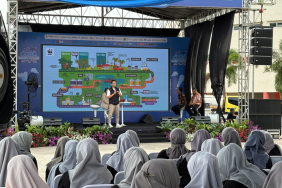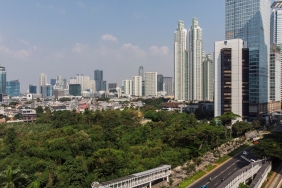WWF LAUNCHES NEW PROGRAM FOR LOW-CARBON CONSUMPTION AND PRODUCTION PATTERNS
Jakarta, 26 July 2017 - WWF-Indonesia launched a new program to encourage sustainable consumption and production patterns. The program titled "Establishing Sustainable Consumption and Production in Thailand, Indonesia and the Philippines (SCP TIP)" is affiliated with UNEP's 10 Years Framework Program (10YFP) - Sustainable Food Systems Programme. The SCP TIP program is led by WWF-Germany, and is implemented by three WWF offices in Thailand, Indonesia and the Philippines.
The SCP TIP aims to help encourage communities in the three countries to integrate and apply the principles of sustainable consumption and production to support national climate change mitigation strategies in terms of politics, business practices and civil society movements.
Aditya Bayunanda, Director of Policy, Sustainability and Transformation of WWF-Indonesia, in his speech said, "Indonesia is now not only a producer country in global trade but also a world-class consumer, with a population of 250 million, Indonesia consumes more than half of the timber, paper and palm oil products it produces itself, it is time for that consumption to also lead to responsible consumption."
Indonesia is the sixth largest emitter of greenhouse gases from deforestation. However, Indonesia has also committed to reduce the rate of climate change through the National Action Plan and Regional Action Plan for Greenhouse Gases (RAN/RAD GRK) by reducing emissions by 26% from deforestation and land use activities by 2020.
"Responsible consumption means paying attention to the origin and staying away from products related to illegal practices, human trafficking, environmental destruction and destruction of the livelihood of local communities." continued Bayunanda.
With 4.4 billion people (2015) living in the region, Asia is home to 60% of the world's citizens. By 2018, more than 50% of Asia's population is expected to be urbanized, which means they will be consumers. By 2050, an estimated 2 out of 3 Asians will live in cities (UN Habitat, "The State of Asian and Pacific Cities 2015" and "UN World Population Prospects: The 2015 Revision").
More and more people live in large cities called 'megacities', which are cities with more than 10 million inhabitants. Worldwide there are 37 megacities, the two largest of which are in Asia, namely Tokyo (39 million people) and Greater Jakarta (31.5 million people). The large number of people in cities has consequences for consumption patterns, especially with the increase in the middle class population, which will affect household consumption patterns, transportation and food.
"Responsible production, supported by sustainable consumption patterns, can be a solution to the various environmental and natural resource problems that we have been facing lately. Sustainable production and consumption can balance social, economic and environmental achievements as envisioned in the SDGs," said Noer Adi Wardojo, Head of the Center for Environmental and Forestry Standardization of the Ministry of Environment and Forestry (Pustanlinghut KLHK) of the Republic of Indonesia.
Wardojo added, "We welcome this program conducted by WWF, as support from the public for the realization of a sustainable Indonesia." Pustanlinghut KLHK is the focal point of SCP Indonesia's stakeholder collaboration that covers a number of topics, including ecolabeling and Green Public Procurement, Consumer Information, Resource Efficient and Cleaner Production, and Sustainability in Public Facilities."
The three-year SCP TIP program is funded by the German Federal Ministry for the Environment, Nature Conservation, Building and Nuclear Safety (BMUB) as part of the International Climate Initiative (IKI). The SCP TIP program launch event took place at Goethe-Institut Jakarta and was attended by invitees representing government agencies, the private sector and the community.





